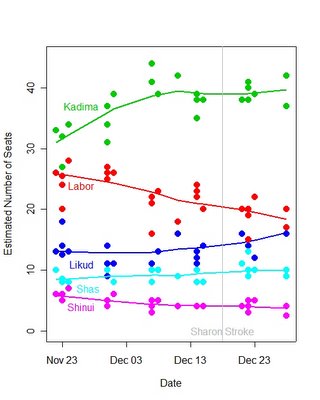
This was posted before Prime Minister Sharon suffered his second and far more serious stroke on January 4. Clearly the political landscape will be dramatically changed because of this second event. I've considered taking this post down out of consideration for the emotional impact of Sharon's illness. I've decided not to, since my purpose here at PoliticalArithmetik is to document the dynamics of political events, and what comes next will certainly be of great interest to political analysts. As it stands, the original post below documents clearly the prospects of Sharon's Kadima party just before his second stroke. Subsequent events and polling will further illuminate the dynamics of Israeli politics in the wake of this stunning turn.
Support for Prime Minister Ariel Sharon's new Kadima party appears to have remained stable in the wake of the Prime Minister's December 18th stroke and brief hospitalization. In seven polls taken since Sharon's illness, Kadima continues to receive support sufficient for 39-40 seats in the Knesset. (Likud currently holds 40 seats.) As a new party, rooted primarily in Sharon's personal appeal, it is interesting that support has not wavered in the past 10 days. The "health issue" is likely to be raised explicitly in the coming elections, set for March 28. For an example of the possibilities, see this column from the Jerusalem Post.
Support for Kadima has risen since Sharon broke from Likud and established the new party on November 21. From initial support of 30-32 seats, Kadima grew to near 40 seats by the second week of December. Since that time there has been no evidence of a systematic trend in support, which has remained stable at about 40 seats.
The same cannot be said for Labor, behind new leader Amir Peretz, which has seen a substantial decline in support from some 25-26 seats to 19-20.
Meanwhile, Likud has seen a small upturn in support which has continued since the December 19 selection of former Prime Minister Benjamin Netanyahu as party leader. Immediately following Sharon's withdrawal, Likud polled around 13 seats but has since risen to 16 or 17. While a dramatic decline from the 40 seats held by Likud in the current Knesset, this modest
gain is the first hopeful news for Likud in the past six weeks.
The center Shinui party appears to have virtually collapsed. From a total of 15 seats and third largest party in the current Knesset, Shinui is currently polling as low as 4-5 seats.
If Kadima, Labor and Likud match their poll results, they should win 75-77 seats. Currently Likud, Labor and Shinui hold 76 seats. With Shinui at only 4-5 additional seats, this division of the vote suggests that there has been considerable shuffling among the these three parties plus the new Kadima party, but the other parties have retained most of their aggregate strength.
The Sephardic Shas party, currently the 4th largest bock in the Knesset with 11 seats, is polling near it's current level with 9-10 seats in most polls.
The remaining smaller parties are polling between 3-8 seats each, a total of some 30-35 seats divided among them. There have been no strong trends among this group. The latest results are
Arab parties, 8-9 seats
Yachad, 4-5 seats
National Union, 3-8 seats
Yisrael Beiteinu, 6-7 seats
Yahadut Hatorah, 5-6 seats
NRP, 3-4 seats